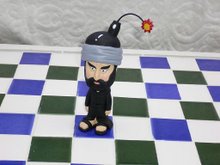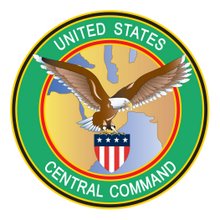 Al-Qaida ousted from one Iraqi district
Al-Qaida ousted from one Iraqi district By TODD PITMAN, Associated Press Writer 1 hour, 51 minutes ago
BAQOUBA, Iraq - Across the walls of the villas they seized in the name of their shadow government, black-masked al-Qaida militants spray-painted the words: "Property of the Islamic State of Iraq
They manned checkpoints and buried an elaborate network of bombs in the streets. They issued austere edicts ordering women not to work. They filmed themselves attacking Americans and slaughtered those who did not believe in their cause.
For months, al-Qaida turned a part of one Baqouba neighborhood into an insurgent fiefdom that American and Iraqi forces were too undermanned to tackle — a startling example of the terror group's ability to thrive openly in some places outside Baghdad even as U.S.-led forces struggle to regain control in the capital.
U.S. forces took back the entire Tahrir neighborhood during a weeklong operation that wrapped up Sunday in Baqouba, a city 35 miles northeast of Baghdad that al-Qaida declared last year the capital of its self-styled Islamic caliphate.
Though the operation was a success — it forced the guerrillas to either flee or melt into the population — soldiers say the extremists are likely to pop up anywhere else that's short on American firepower.
Indeed, even as the Tahrir operation took place, insurgents stepped up attacks on a new police post in the adjacent Old Baqouba district — which was also cleared recently — pounding it daily and killing Baqouba's police chief in a suicide car bombing.
Insurgent teams, meanwhile, have tried to infiltrate back into Tahrir, U.S. Capt. Huber Parsons said Tuesday.
When U.S. forces began pouring into the embattled district last week, residents said it was the first time they'd seen significant numbers of coalition troops since last fall. U.S. troops set up a combat outpost in northern Tahrir several months ago.
But to the south, residents recounted watching helplessly as masked fighters came and went freely in past months, piling weapons into the back of vehicles and taking over the homes of Shiites who had either fled or been killed.
"We were terrorized," said one man. "We wondered, Where is the government? Why have they forgotten us? Why does nobody come here to help?"
Baqouba has been wracked by violence for years. But insecurity has skyrocketed since late last year, partly because Sunni militants fleeing Baghdad's security crackdown have sought refuge here.
An estimated 60,000 people have fled the city of 300,000, most of them Shiites driven out by Sunni hit squads. Meanwhile, vital government subsidized food and fuel shipments, which normally flow in from Baghdad, ceased arriving because of political corruption in the capital, said Col. David W. Sutherland, whose 3rd Heavy Brigade Combat Team, 1st Cavalry Division, is responsible for security in Diyala province.
"In an insurgency, if you don't have faith in the government or security forces ... you turn to those who will offer you a better way," Sutherland said. "The terrorists were able to drive a wedge between the government and the people. But we're reversing that."
The battle for Baqouba picked up in mid-March.
U.S. commanders rushed in Stryker infantry battalion which helped clear, and eventually calm, the southern district of Buhriz, once the city's most violent area. While American forces fought there and in Old Baqouba, they watched neighboring Tahrir spin out of control.
Parsons said video from an unmanned aerial drone last month showed suspected al-Qaida militants searching vehicles at a checkpoint. They held back from destroying it, choosing to "track them to see where they were going, where they lived," Parsons said.
Then, for eight days in early April, al-Qaida battled fellow insurgents from the nationalist 1920 Revolution Brigades, who residents said were trying to resist the terror group's bid for control. The nationalist fighters ran out of ammunition and fled.
With the district firmly in al-Qaida's hands, local leaders and sheiks called on American and Iraqi soldiers for help.
U.S. forces first sent road-clearing teams into southern Tahrir April 22. Insurgents fired mortars and popped out of windows with rocket launchers, destroying three de-mining robots. Tanks and infantry blasted surrounding buildings, killing more than a dozen attackers.
The next day, Parsons moved three of his platoons into central Tahrir on foot. All three came under fire. The day ended with a 30-minute firefight at dusk in which rounds ripped through palm groves. Apache helicopters shot Hellfire missiles at a house insurgents had fled to, lighting the sky in thunderous blasts.
Fighting eased afterward. Soon, previously empty streets were teeming with crowds of people who shook soldiers' hands as they passed.
Residents recounted watching groups of masked men dig into roads with jackhammers in recent weeks, planting bombs and stringing copper wire to trigger them from houses and schools.
The militants mostly kept to themselves, but they distributed puritanical leaflets commanding women to cover themselves in black from head to toe, and stay home from work. They ordered tea shops shut and warned men not to smoke water-pipes.
"No one dared ask them why," said one father. Those who did drew unwanted scrutiny — and a possible death sentence, he said.
Families told of Shiites who went shopping and never returned. One man said his brother had been kept and beaten in a makeshift prison with two dozen others.
At night, masked men stormed homes, robbing and carrying out extra-judicial killings. "Nobody knew whether they were al-Qaida or the police or just common criminals," said a baker named Ali. "It was total lawlessness."
Like other residents interviewed, Ali declined to give his full name in fear of reprisals from insurgents.
Insurgents blocked roads with concrete barriers taken from coalition forces. One checkpoint was so permanent that U.S. troops found a schedule naming those who manned it daily.
In some empty homes, guerrillas knocked small holes in the walls to use them as sniper positions. Below some, bullet casings littered the floor.
Half a dozen of houses containing weapon stashes, as well as one booby-trapped villa with a 155mm artillery shell rigged to blow behind its front door, were leveled. Many stashes were pointed out by residents.
One cache of rocket launchers and Kalashnikovs was found simply leaning against a wall in the back room of an abandoned home, along with handcuffs, ski masks, radio handsets and a video camera. A tape inside it showed a "Husky" American bomb disposal vehicle trying to de-mine a road in Baqouba.
Parsons eyes widened when he saw it: the driver and the vehicle work with his Stryker unit.
On the video, machine-gun fire erupted amid cries of "Allahu Akbar," God is Great, targeting the vehicle and a de-mining robot.
The footage cut abruptly to an unrelated, final scene: A closeup of a blood-splattered corpse whose blindfold had been pulled from his face. The man looked Iraqi and appeared to have been tortured.
Soldiers said they believed al-Qaida operatives had lived in Tahrir, using homes there as a kind of rear base. In the living room of one home residents said served as a medical aid station for wounded fighters were empty beds, neck braces and x-rays scattered across the floor.
Although insurgents claimed many houses in the name of the Islamic State of Iraq, they tried to erase their work with splotches of white paint two months ago — realizing the proclamations might be too conspicuous. On some gates and walls, the paint was too thin to cover the black Arabic lettering.
The Islamic State is a coalition of eight insurgent groups. Late last month, it named a 10-member "Cabinet" complete with a "war minister," an apparent attempt to present the Sunni coalition as an alternative to the U.S.-backed, Shiite-led administration of Prime Minister Nouri al-Maliki.
Parsons assured each family that U.S. troops and police would stay behind to keep insurgents out after he left, and establish a new police station.
Al-Qaida "had months and months to run rampant because we didn't have the forces available to come in here until now," Parsons said. "They controlled this neighborhood, but they don't anymore."





No comments:
Post a Comment